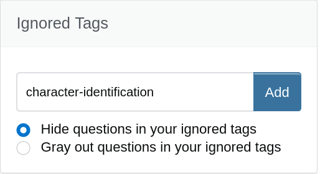Identification questions are an issue throughout Stack Exchange. Movies.SE banned movie identification questions and EarthScience.SE banned rock identification questions, while many other sites allow them. These questions are inherently about the site's subject matter, but exceptions are made at some sites: the usual argument against them is that they can drown out other questions, and are not of interest to experts.
Currently a proportion of image-transcription questions are closed using the reason:
Questions asking for translations are off-topic unless prior research effort is clearly indicated; we're here to help you learn, not provide a bulk translation service.
And often it's hard to figure out why it's applied to one question, and not another.
Importantly, here I'm talking about image transcription (identifying and writing down characters in images), not to be confused with translation. The OP is asking for the plaintext of Chinese in an image.
Chinese transcription requests are inherently about the Chinese language. So, in my way of thinking at least, they are on-topic by default. Thus, if we are to declare them off-topic, we should explain here on meta why they're off-topic.
Question: Are image transcription requests on-topic? ("What does this image say?")
Please give your thoughts on this; it's important that we clarify these close-reason boundary regions.
We need users to cast close votes. We thus need close reasons designed around what users generally agree should be closed. But to get there, we need more user participation on meta.
Currently we have Image-only questions should be closed as off-topic but it's sporadically implemented.
This is what I'm thinking at the moment...
What's the problem?
Closing these questions is currently done inconsistently, with e.g. 1 and 2 being closed and many others left open. I feel this unpredictable question closure is unfair to the users of the site. "Why was my question closed when many others were not?" Honestly, I don't know the answer, and I'm a mod here! Bad luck, perhaps?
The often-used close reason given is
Questions asking for translations are off-topic unless prior research effort is clearly indicated; we're here to help you learn, not provide a bulk translation service.
But these questions are asking for transcriptions: it's not the same thing. Admittedly, they often ask for translations, like Translation of this script to English please?, yet what immediately obstructs the user is the lack of a transcription.
But surely we must close some of them, right?
Some answers to transcription-request questions are interesting and educational, while others are not. Probably the most meaningless one I've seen thus far is "What does this Chinese CAPTCHA say?" (which isn't closed (!!)). I get the feeling that what users don't like are meaningless and tedious questions like:
- My computer malfunctioned and printed out these random characters; what does it say?
- What are the 6000 characters in this screenshot?
- What is the 124123-rd character in this text?
- What is the 124124-th character in this text?
- What is the 124125-th character in this text?
- What does this blurry image in 0.0005pt font say?
There's no significance to the answers. It's pointless. It's a waste of time. And there's an infinitude of such questions: I could go outside and take a photo of almost anything and create a meaningless "what does this image say?" question. This makes me feel like we need some kind of baseline. And the baseline should be more about "significance" and "interest" than "effort shown".
I'm starting to feel the boundary should be Does anyone (other than the OP) care about what's in the image? Suppose a user took a photo of Tiananmen square, and asked "What does this say?" It's likely of interest to other people.
Do we really need the OP to "show effort"?
If we ask the user to "show effort", the best we're going to get is them editing in something obvious like "I don't know where to start" or "I don't know how to type Chinese". I do not believe this will lead to a better question; I don't recall ever seeing an image-transcription question re-opened after a user "showed effort".
Moreover, I think we all know that going from image to plaintext can be a hard problem, likely impossible for anyone who hasn't studied Chinese, or who doesn't have Chinese input methods on their device, even in very simple cases (like 四). In hard cases, it can be impossible for native Chinese speakers.
I think the "show effort" criteria arose from sites like StackOverflow and Math.SE, where what is omitted fundamentally changes how people write answers. Compare:
Someones asks a graph theory question on Math.SE, and states "I don't know what Δ means". Then an answer will explain what Δ means.
Someones asks the same graph theory question on Math.SE, and states "I don't know if I should use induction". Then an answer will address whether or not the user should use induction.
Someones asks the same graph theory question on Math.SE, and gives their attempt. Then an answer might point out where the error lies in their attempt.
But for "what does this image say?" questions, the obstacle is virtually always the same: they can't get the plaintext from the image. It doesn't matter if they explicitly state "I can't get the plaintext from the image" that because (a) we already know that, and (b) it doesn't affect the answers. And I feel it is unreasonable to request the OP to do something they are incapable of doing. If a user feels that adding the sentence "I can't get the plaintext from the image" changes the question from off-topic to on-topic, then instead of voting to close, they can click "edit" and add it into the question.
If we were to follow "the letter of the law", then e.g. the no-effort question Need translation for painting in regards to who the artist is and what it reads in Chinese calligraphy should be closed. However, it has a score of +2 and an answer with a score of +3. Nobody seems to care that the OP didn't show effort.
How are image-transcription questions being received?
If we look at the character-identification questions (and their deleted counterparts), they are getting upvoted, usually a score of 1 or 2. Some, but not many have a negative score. Moreover, they are even being curated with users editing titles to make them useful and retagging. Clearly, multiple users like these questions enough to upvote them and answer them. (Oh, and these are not my upvotes.)
Because their answers are sometimes simple, answers often come in very quick, before closure. And even if they are closed, the author's often get answers in the comments anyway. I don't think we have a "too easy" threshold, and honestly, I don't mind some low-hanging apples to give new users more chances to participate.
Is the cure (closing them) worse than the disease (answering them and moving on)?
When there are multiple users here who are actively upvoting, maintaining, and answering such questions, I think it's time we thought about officially declaring such questions on-topic, except when they're virtually meaningless, like "What does this Chinese CAPTCHA say?" or when the image is blurry to the point of being unreadable. (Note: This is not an official announcement; this is a request for feedback.)
When a class of questions are being arbitrarily closed, it leads to unfairness and disharmony. This needs to change.
Aren't we meant to be optimizing for pearls, not sand? The reality is that sometimes these questions lead to good answers. If we close them as off-topic we lose the pearls along with the sand.
What about the people who don't like them? A big thing for me is this: if they are properly tagged character-identification then users can simply ignore the tag if they don't like these questions. Provided users are curating these questions, ignoring the tag works, although there are those translation questions which really are transcription questions.
Is the site going to be flooded with transcription requests? I'm not sure. Maybe this is a risk. If we just quickly answer them, perhaps they'll quickly just drop off the front page. At the same time, the question rate here is quite low.
Update: This Data Explorer query (thanks to Glorfindel) shows that 70% of users of the character-identification only ask a single question at the site.
Update: I want to mention r13's comment:
@Becky李蓓 Does the OP show any interest in learning the content/context of the art piece, or simply requesting the "word recognition and translation" service?
That's a fair point: these once-off "what does this say?" questions seem... pointless. Especially in large numbers. Especially if the OP doesn't care (much) about the answer.
Update: This is what I'm thinking at the moment. There are three roles here:
The OP. There seems to be three reasonable baseline expectations:
- If possible, try OCR or Google Translate (hand-drawing characters).
- Provide clear images.
- Give context: where did it come from? why is it interesting?
Those deciding whether to vote to close. They have to balance a bunch of considerations:
Is there anything concrete the OP can do to improve their question?
(Maybe leave a comment: "Could you please [edit] your question to include pla pla pla?" and remember to vote to reopen if they do so.)
Does anyone other than the OP consider the image interesting?
Would the answers have any historical, cultural, educational significance?
Could the question potentially lead to good answers (pearls)?
Are we being welcoming?
I don't like these questions, but some people do; could I just ignore the character-identification tag?
It looks like these questions will get different answers from different users. Personally, I could envisage someone browsing these questions in order to practice reading handwriting, deciphering seals, etc.
Diamond mods.
Personally, I don't feel an off-topic question ordinarily requires moderator intervention (we're meant to be guiding users to better utilize the site, improving questions and answers, helping users understand and refine site policy, watching out for sock-puppets and suspicious voting). Sure, if a mod sees a "you've got to be joking"-level off-topic question (what do these 1000 images say?), it's not a big deal to swing the diamond-hammer. But when there's blurry boundaries, multiple considerations, and conflicting viewpoints, it's risky diamond-hammer closing questions: it may not reflect community opinion.
We need clearer close reasons (usable by people who don't spend time on meta). Afterwards, the mods will need to go back and reopen/close the relevant questions (this would take a coordinated effort). Ideally we should ensure they all have the character-identification tag and have as-useful-as-possible titles.


